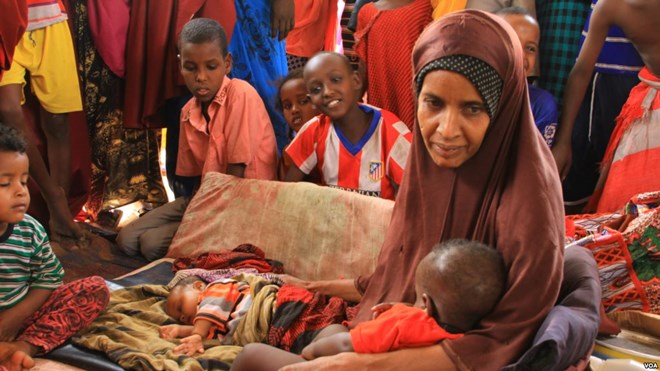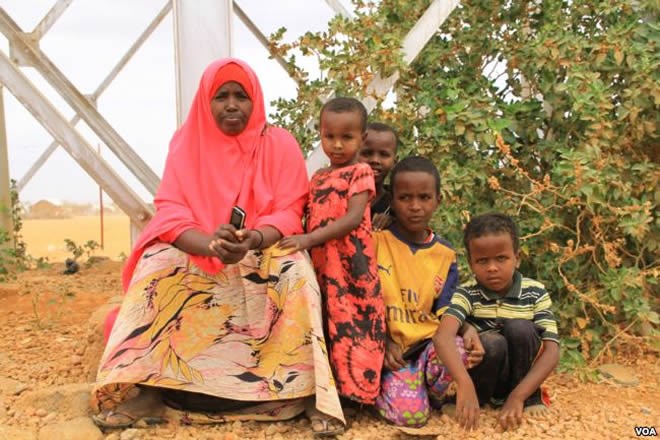
Tuesday March 7, 2017
By Jill Craig

A mother holds her baby at Hagadera transit camp in Kenya’s Dadaab refugee camp, Sept. 20, 2016. (J. Craig/VOA)
NAIROBI — U.S. President Donald Trump signed a revised executive orderMonday, calling for a 90-day suspension of admissions for people from six Muslim-majority countries, including Iran, Libya, Somalia, Sudan, Syria, and Yemen, if they do not already have visas. All refugees must wait 120 days. The ban, coming six weeks after Trump’s original order, which was blocked by federal courts, takes effect March 16.
Ahmed Omar Bihi, 42, is a Somali refugee who has lived in Kenya’s Kakuma refugee camp for five years, after he was transferred from the Dadaab refugee camp - his home since he fled Somalia in 1992.
He says it is difficult for him to stay in a refugee camp, while so many of his friends are in the United States.
“Most of our neighbors, most of our colleagues, most of our friends are living there, having a good job, having a good education, having new wife and new life, so I feel very, very, very traumatic when I see the pictures from there, talking to me, sending condolences, condoling with me, saying that Trump will change his mind,” said Bihi.
Another refugee, 25-year-old Chelia Rose, has lived in Kakuma for the last 15 years, since she fled South Sudan. Although South Sudan is not on the banned country list, Rose’s refugee status would preclude her from obtaining a visa for 120 days, if she was in the pipeline for resettlement.
Losing hope
She says she is still hoping for the chance to come to the United States, in order to obtain both an undergraduate and a master’s degree, so that she might someday return to South Sudan and help her country.
“People who are hopeless, they at least got hope,” said Rose. “But now when this ban is there, it’s going to make them lose hope. People will not, I will not even feel good because I won’t get that chance. Because I was also thinking I might get the chance of going out, to fulfill my dream and to make my dreams to come true one day.”
 A woman sits with children near a water tower in Kenya’s Dadaab refugee camp on Sept. 19, 2016. (J. Craig/VOA)
A woman sits with children near a water tower in Kenya’s Dadaab refugee camp on Sept. 19, 2016. (J. Craig/VOA)
University student Mohamed Abdullahi lives in Nairobi. He says that keeping Somalia on the list of banned countries will only hurt anti-terrorism efforts against the Islamist militant group al-Shabab.
“So once you have added the list to Somalia [added Somalia to the list], it will give a very strong boost to the ideology of al-Shabab,” said Abdullahi. “If USA that was supporting your government rejected you guys to go and visit their country, what will be the next move? So al-Shabab is going to have an opportunity to call for new recruits against the West.”
Sending bad message
Human Rights Watch released a statement saying that the order will "scapegoat refugees and send a message that Muslims are not welcome in the U.S." It further stated that the new order "cannot escape the statements from Trump as candidate and president indicating the prejudicial intent to bar the entry of Muslims as a religious category."
Arguing that the new executive order ‘will disrupt thousands of lives due to terrorism fears without factual basis,’ the U.S. director of the Norwegian Refugee Council said that the ‘process of refugee resettlement should be orderly, not an emotional rollercoaster."
Addressing a limited pool of reporters on Monday, Secretary of State Rex Tillerson, Department of Homeland Security Secretary John Kelly, and Attorney General Jeff Sessions called the move critical to U.S. national security.
“As threats to our security continue to evolve and change,” Tillerson said, “common sense dictates that we continue to re-evaluate and reassess the systems that we rely upon to protect our country.”